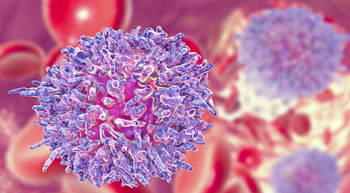
Updated data from the DREAMM-7 trial support the use of belantamab mafodotin plus bortezomib/dexamethasone as a potential new standard of care in relapsed or refractory multiple myeloma, according to Vania Hungria, MD, PhD.

Updated data from the DREAMM-7 trial support the use of belantamab mafodotin plus bortezomib/dexamethasone as a potential new standard of care in relapsed or refractory multiple myeloma, according to Vania Hungria, MD, PhD.

Imlunestrant, alone or in combination, may provide an all-oral, targeted therapy option following progression for patients with ESR1-mutant, ER-positive, HER2-negative advanced breast cancer.

T-DXd improved PFS, vs treatment of physician’s choice, irrespective of time to progression or type of endocrine resistance among patients with hormone receptor-positive, HER2-low/-ultralow metastatic breast cancer.

The addition of tafasitamab to lenalidomide and rituximab reduced the risk for disease progression or death by 57% in patients with relapsed/refractory follicular lymphoma.

Second-generation BTK inhibitors exhibited a significantly lower incidence of cardiac adverse effects in B-cell malignancies, according to a meta analysis.

Patients with mantle cell lymphoma in first complete response with undetectable MRD did not benefit from consolidative autologous transplant, according to results from the ECOG-ACRIN EA4151/BMT-CTN 1601 trial.

Treatment with tafasitamab for relapsed/refractory DLBCL in the United States was supported by data from a retrospective analysis.

Real-world treatment with liso-cel showed a broad spectrum of outcomes that were comparable to those in the pivotal TRANSFORM and PILOT trials in patients with relapsed/refractory large B-cell lymphoma.

Secondary end points of the ASC4FIRST trial continue to show superior results with the use of asciminib, over standard-of-care TKIs in CML.

Treatment with acalabrutinib plus venetoclax, with or without obinutuzumab, improved PFS over standard-of-care chemoimmunotherapy in patients with treatment-naive CLL.

Treatment with subcutaneous daratumumab significantly improved progression-free survival in patients with intermediate- or high-risk smoldering multiple myeloma.

Treatment with epcoritamab alone demonstrated deep responses in heavily pretreated patients with CLL, according to the expansion and optimization cohorts in the EPCORE CLL-1 trial.

“By addressing these issues, we can ensure that all patients, regardless of their socioeconomic status, have the opportunity to benefit from potentially curative treatments,” one expert says.

An expanded analysis from the phase 3 CEPHEUS trial showed that daratumumab plus VRd improved MRD responses as well as progression-free survival among patients with transplant-ineligible or -deferred newly diagnosed multiple myeloma.

Long-term follow-up showed continued meaningful responses in patients with relapsed or refractory KMT2Ar acute leukemia who were treated with revumenib, with no new safety signals found.

With a link to specific genetic mutations in myelodysplastic syndromes, tobacco smoking may be associated with disease progression and survival.

Treatment with bicistronic CD19/CD22-directed CAR T-cell therapy appeared safe and effective with high remission rates among children with relapsed/refractory B-ALL.

Meta: Blinatumomab plus chemotherapy, vs chemotherapy alone, significantly improved DFS rates and was well tolerated in pediatric patients with standard-risk pediatric B-ALL.

The FDA set a PDUFA date for glofitamab in relapsed or refractory diffuse large B-cell lymphoma for July 20, 2025.

The FDA granted fast track designation to CRB-701 for the treatment of adult patients with relapsed/refractory metastatic cervical cancer.

The NCCN Guidelines Version 1.2025 for Cancer of the Nasopharynx listed toripalimab plus chemotherapy as the standalone preferred regimen in the frontline treatment of patients with advanced nasopharyngeal carcinoma.

Cadonilimab plus platinum-based chemotherapy improved progression-free and overall survival in advanced cervical cancer compared to placebo, showing significant clinical benefits.

The agency granted approval to durvalumab for the treatment of a subset of patients with limited-stage small cell lung cancer.

Zenocutuzumab received accelerated approval from the FDA for the agent to treat non-small cell lung cancer (NSCLC) or pancreatic adenocarcinoma (PDAC) harboring an NRG1 gene fusion.

The phase 3 PANOVA-3 trial, designed to evaluate concomitant treatment with tumor treating fields and chemotherapy, met its primary end point of overall survival in unresectable, locally advanced pancreatic adenocarcinoma.

Based on findings from a phase 2 expansion cohort, the FDA granted breakthrough therapy designation to sacituzumab tirumotecan for use in select patients with EGFR+ non–small cell lung cancer.

The FDA has granted fast track designation to LBS-007 for the treatment of patients with acute myeloid leukemia.

The combination of onvansertib plus FOLFIRI/bevacizumab showed promise among patients with KRAS-mutated metastatic colorectal cancer.

Following a phase 1b trial, the potent and selective dual inhibitor of IRAK1 and IRAK4 received fast track designation for the treatment of patients with lower-risk myelodysplastic syndrome.

According to the American Lung Association, biomarker testing gaps and low screening rates continue to hinder lung cancer survival; however, rates have improved in the last 5 years regardless.